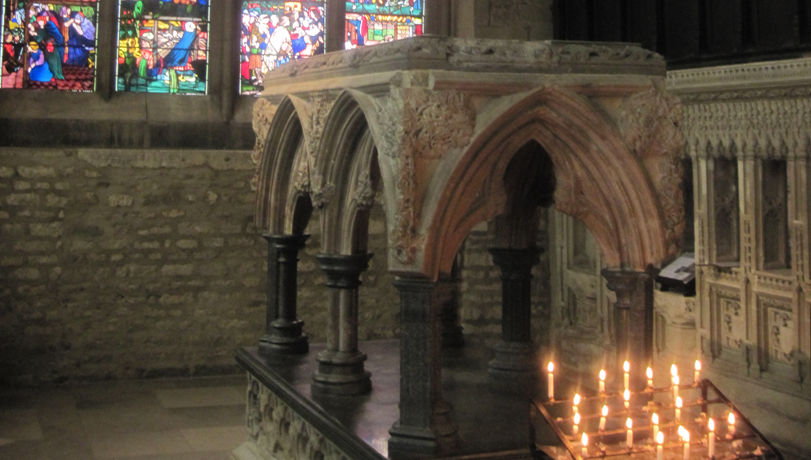 |
| Anglican Corpus Christ, Time Square, New York City. |
The Feast of Corpus Christi was instituted only in 1246 for the Thursday after Trinity Sunday. Among the reasons for its establishment were growing popular devotion to the Blessed Sacrament (many urban areas had dozens of lay-societies or 'confraternities' dedicated to the Blessed Sacrament -Liege had over forty) and thus the desire of many to have a festival allocated for it, and conflicts over the nature of the sacrament. At the time the feast was established, Pope Urban IV asked St. Thomas Aquinas to write the liturgy for the feast and to explain the nature of the sacrament. (It is from St. Thomas Aquinas that we get the hymns 'O Salutaris Hostia' (O Saving Victim), 'Pangue Lingua' (Sing my Tongue), Tantum Ergo, and several others.) Corpus Christi remains the Church's holiday to celebrate the institution of the Eucharist. A celebration of the Sacrament was meant to reflect a celebration of the our salvation by Christ's flesh and blood given up on the cross. As I said in a previous post, on Anglican Eucharistic Theology, I think that the early Christian belief of the nature of the Sacrament, that it is the body of Christ both in essence and efficacy to those who believe it is just that, complies in high and low-church. The Anglican Church does in fact, through its worship in the Book of Common Prayer, make plain its belief in Christ's presence in the Eucharist -this is furthur investigated in Bruce Ford's essay "How the Episcopal Church Teaches the Catholic Faith." Whatever a parish believes about the nature of the Blessed Sacrament, however, the feast is appropriate in both high and low-Church traditions because it is the Church's thanksgiving for its continuing communion with Christ and its worship -and the Eucharist remains the principal liturgy of the Anglican Church whatever its orientation. This is the traditional reason for the celebration of the Body and Blood of Christ, but I believe that with today's position of Christianity there is yet another reason.
Another case for keeping the feast of Corpus Christi is its proximity to the Pentecost and the liturgy's inclusion of an outdoor procession. It is very rare to find societies that are wholly Christian today -much less Christians of the orthodox faith. Corpus Christi can be celebrated then both as the Church's celebration of the Eucharist and 'Pentecost in action' by bringing the Eucharist out of the church and into the world to proclaim the risen Christ. As part of the Church's duty is to bring people into it, Corpus Christi as a sharing of Christ via the Eucharist is appropriate in the season after Pentecost when the Church celebrated its foundation and the beginning of its spread all over the world. The Corpus Christ Liturgy does not have to be an outdoor procession in the traditional sense, it can be any way of bringing the Eucharist to the masses. A procession of the sacrament or even celebrating the Eucharist outdoors in a public area would cover both aspects of the feast: a thanksgiving for the institution of the Eucharist and the revelation of the risen Christ to the world.
O God, Who under this wondrous Sacrament hast left us a memorial of Thy Passion, grant us, we beseech Thee, so to reverence the mysteries of Thy Body and Blood, that in ourselves we may ever sensibly have fruition of the redemption which Thou has wrought. Who with thine only Son Jesus Christ and the Holy Spirit, lives and reigns, one God, now and forever. Amen.
Collect for Corpus Christi from the Sarum Missal.


thank you for sharing
ReplyDeleteviagra asli
obat viagra
viagra usa
jual viagra
viagra obat kuat
obat kuat usa
obat kuat viagra
jual obat kuat viagra
The choice of the Thursday after Trinity Sunday is important, as due to the Octave of Pentecost it was the first free Thursday on which to look back to Maundy Thursday and the Institution of the Eucharist at the Last Supper. Aquinas' hymns and other liturgical provision for the feast make the link clearly. It's a wonderful feast because it celebrates Christ, truly present with us.
ReplyDeletePraise God !
ReplyDeleteMy name is Reverend Byaruhanga K Stephen an Anglican priest working with St Peter's Cathedral Hoima, Uganda.
I'm very delighted to hear about you,and thank you for the great job you are doing to expand God's Kingdom.
Here in Uganda,we doing well.The gospel is being preached and some people are commiting their lives to Christ.
We are seriously preparing for Christmas.
Let end here wishing you God's blessings.
For more information about the Ministry,you can reach me on telephone number+256772863671